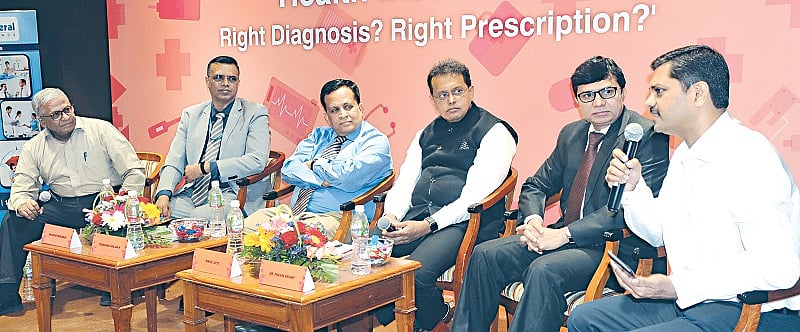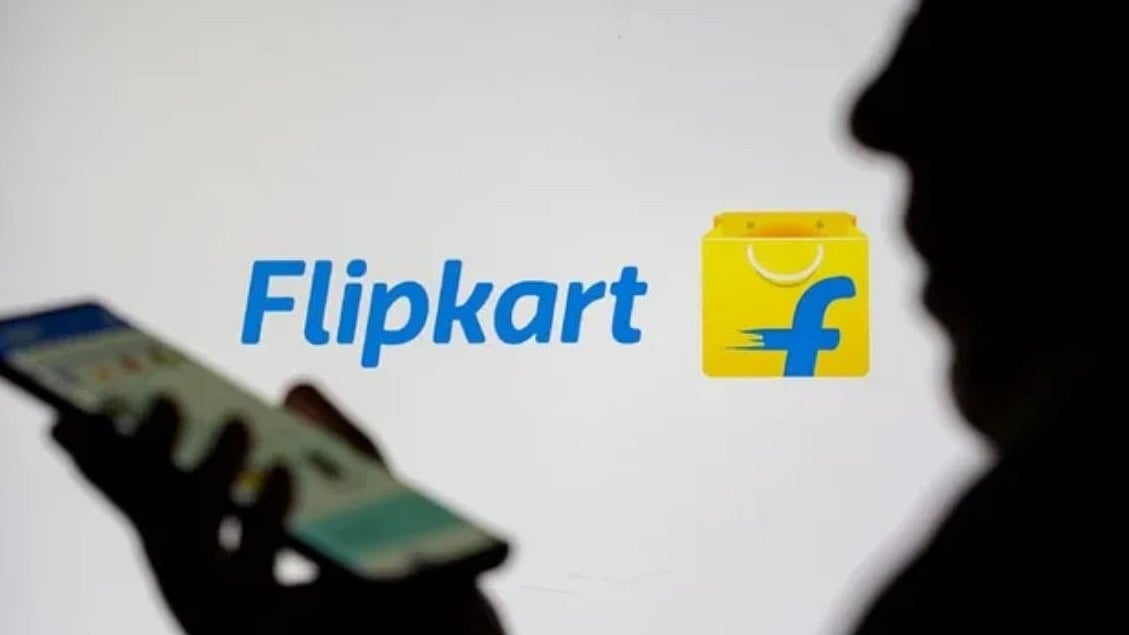At the The Free Press Journal’s (FPJ) ‘Health Insurance: Right diagnosis? Right prescription?’ conference, the first panel discussion focused on opportunities and challenges in the health insurance sector. The panelists for the discussion were (in alphabetic order) Nikhil Apte, Chief Product Officer, Royal Sundaram General Insurance; Eswaranatarajan N , Senior EVP and COO, Kotak Mahindra General Insurance; Bhaskar Nerurkar, Head Health Administration Team, Bajaj Allianz General Insurance and Pravin Swamy, CEO, Godrej Memorial Hospital. The discussion was moderated by FPJ’s R N BHASKAR and S NARAYANAN. Editorial support was provided by PANKAJ JOSHI. Below are edited excerpts.

Today, urban customers are ready to talk beyond, and focus on wellness.
— Bhaskar Nerurkar, Head Health Administration Team, Bajaj Allianz General Insurance
Bhaskar Nerurkar: Health insurance funds 6-7 per cent of healthcare cost, and the Minister just quoted figures that 80 per cent health issue instances make people sell assets or incur debt, particularly in rural areas where coverage is the least.
So how do we increase penetration so that Rs 42,000 crore claims become Rs 5 lakh crore. Second, each insurer approaches same customer segment, giving the same pitch of indemnity and a health crisis. Today, urban customers are ready to talk beyond, and focus on wellness.
In OPD treatment, there are products for dental treatment in developed nations which India has to consider too. In India in some cases situations like maternity and child delivery has become an event, but in other cases, it is still a struggle.
About 60 per cent population would be finding it difficult to find proper care and maybe 10 per cent fall in the event celebration category. Insurers are supposed to provide to all of these, we have to think how to address this.
The Pradhan Mantri Jan Arogya Yojana is an exciting factor, there are 50 crore people or 10 crore families and even a Rs 1,000 crore premium means a new market of Rs 10,000 crore which no one wants to miss out on.

Telecom went for segmentation whereas insurance went for high value products.
— N Eswaranatarajan, Senior EVP and COO, Kotak Mahindra General Insurance
Eswaranatarajan N: When private players were allowed 18-19 years ago in health insurance, we all talked about under-penetration and today we still talk about the same. Why has it not improved? The telecom industry started around the same time, and look at its size today. It went for segmentation, different price points whereas insurance went for high value products.
We do not give what the customer requires. A vegetable seller on the road has different health risks from a corporate executive. If I go to Chennai and there is a dengue scare, can I get a tailored policy for a month? With mobile banking, and social media so active, pushing low-ticket products is possible.
We must answer the question that a 25 year old would ask and that is why should he buy health insurance when the two risks are maternity and travel accidents? You can give him a decent solution and pull him in.
On the matter of expanding to out-patient insurance, as long as general products can be bought at medical pharmacy without verifiable itemised bills, the scope for fraud is immense and out-patient insurance will not happen.
If insurers are paying 70 per cent of premium as claims, it means that all the value we offer does not come in the premium pricing. All the good things, like 60 per cent claims being done cashless today, are not being talked about as much as the problems.

The need to define an adequate insurance amount is especially relevant to the middle class.
— Nikhil Apte, Chief Product Officer, Royal Sundaram General Insurance
Nikhil Apte: All of us, including the government, need to modify perspective on health insurance. It is a product which has a long presence in a person’s life, compared to bank deposits or equity investments. It is the investment most useful to you towards the end of your life. When you are on a ventilator, it is the only investment which works for you.
Second is the disease burden, where both rural and urban India suffer in different degrees. One has more cases of lifestyle illnesses and other are more prone to infectious diseases, and these cases are rising.
India has seven lakh new cancer cases every year, 524 kidney disease deaths daily, and by 2025 we will have nine crore diabetes cases.The need to define an adequate insurance amount is especially relevant for the large middle class, because the upper layer has assets and the lower strata can access government schemes.

While selecting the healthcare provider, costs need not be the criteria but clinical outcome.
— Pravin Swamy, CEO, Godrej Memorial Hospital
Pravin Swamy: One big issue is that all stakeholders – government, regulators, insurance, healthcare providers – all work in silos and have non-holistic focus. Data sharing is vital, and is non-existent. Does the health insurance sector have a CIBIL-like rating?
Secondly, insurance product is sold by agents and serviced by insurance companies to hospitals for ailments to individual customers, who are often the least informed about the details of the product. In most cases, the customer approach is typically to somehow recover the premium which in itself generates frauds.
While selecting the healthcare provider, costs need not be the criteria as much as the clinical outcome of the healthcare exercise. Look at the business practices, the accreditation of the hospitals rather than cost. Insurers need to ensure mandatory health check-ups as a preventive healthcare measure.
Nerurkar: It would be really great if we could have a national-level database. IRDAI has started some work here. Alongside, we are trying to tie up with Nandan Nilekani (the driver of the Aadhaar project) for an open database. In this system, the patient has to accept that diagnostic and other health data can be shared with an NGO-type organisation which anyone in the healthcare ecosystem can access, not just for insurance.
Eswaranatarajan: For the value-for-premium aspect, at the end of the coverage year, we offer each customer a free health check up. But this free service is availed by only 3 per cent customers. This happens with all insurers. The database is never an issue, except from the customer’s end.
Does he want to? Does he see value? Statistics show that health policy premium income has gone up, because the premiums have gone up on larger policy values, and simultaneously the actual lives covered in health insurance have dropped. We can keep talking but if a customer does not see value, what expectations can we have?
Swamy: People can see their rights but not their responsibilities. I think it maybe due to this, at the time of Independence, a Viceroy had said that India would be better off under a dictatorship for 50 years.
The customer today looks at his self-interest, does not realise that if I commit some fraud it will only come back to penalise me. I think we need to speak the language of regulations to be able to get anywhere. At Third Party Administrator (TPA) level, we need data sharing and patient consent, which we take.
On people phasing out of insurance, I think it is because there is too much being bundled up for a high price and no cut-price customisation. There cannot be complete customisation when each body is different, but still some level is possible.
Apte: If you look at pricing, family floater plans are better priced just because there is no anti-selection or picking and choosing among the family. India is a country of large families and we recognise that – we offer a policy where we cover 19 relationships and five generations in one policy.
For a large family, it is good because one may not know who among the family would need it. In health insurance, group segment is around 55 per cent, and it varies across the service providers. Investors in insurance sector look at company’s profitability which depends on sales mix to a great extent.
In case of public sector health insurers, the share of group segment is 70 per cent and in private non-life insurance, the group segment would be around 60 per cent. In contrast, standalone health insurers have just 20 per cent coming from group policies. Overall retail tends to be more profitable partly because of less pricing pressure and also scope for differentiation. Investors are definitely putting money where the focus is more on retail business.
Swamy: On the family floater thing, my view is that it is a very good customer initiative from the insurers’ side. In fact, I am aware of cases where prospective policy holders join together and come and try to club their needs, either for better price or better service. One thing is that in service, the retail policy holder always feels that he gets a slight step-motherly treatment, compared to a corporate policy.
Eswaranatarajan: Digitisation and social media is huge. Today, a company in Denmark sells health insurance and processes claims only through Facebook. Their customers are there on social platforms. So such business models are no longer a luxury, because India has two-thirds of population below 35 years. Innovations and work with fintech companies is on everywhere.
Nerurkar: Definitely, digitisation is good for a part of the process, but finally it is a claim and you need a human touch. At the bedside of the patient, you need to hear that voice which says we are here, we will take care of the matter.









